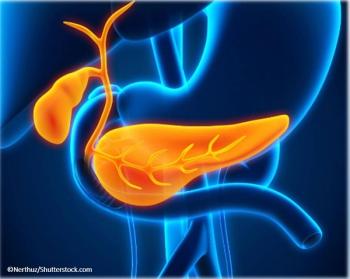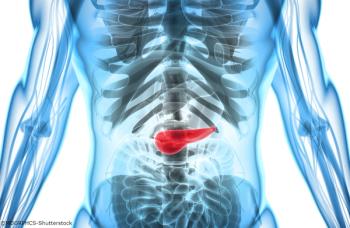
Genomic Marker Predicted Anti–PD-1 Response in Colorectal Cancer
Colorectal tumors that lacked the ability to repair DNA were found to be highly responsive to checkpoint blockade with the anti–PD-1 drug pembrolizumab.
VIDEO:
Dr. Le discusses the trial results.
Colorectal tumors that lacked the ability to repair DNA-or mismatch repair–deficient tumors-were found to be highly responsive to checkpoint blockade with the anti–programmed death 1 (PD-1) drug pembrolizumab, according to data from a phase II study presented at the 2015 American Society of Clinical Oncology (ASCO) Annual Meeting (
Of the patients with colorectal cancer in the study, 62% of those who were mismatch repair–deficient had an objective response compared with 0% of patients who had mismatch repair–proficient tumors.
“These data suggest that genomics may be more influential than histology for mismatch repair–deficient tumors treated with anti–PD-1,” said lead study author Dung T. Le, MD, assistant professor of oncology at Johns Hopkins Sidney Kimmel Comprehensive Cancer Center, who presented the results at a press conference.
The study included three cohorts of patients all assigned to pembrolizumab 10 mg/kg every 2 weeks. Cohort A included 25 patients with mismatch repair–deficient colorectal tumors; cohort B included 25 patients with mismatch repair–proficient colorectal tumors; and cohort C included 21 patients with non-colorectal mismatch repair–deficient tumors.
Looking at the results from the first 48 patients, those with mismatch repair–proficient colorectal tumors had poor response to checkpoint blockade. These patients had a 0% response rate and a 16% disease control rate.
In comparison, patients with mismatch repair–deficient colorectal tumors, or other tumors, including endometrial, stomach, small bowel, and bile duct, had excellent responses. Patients with mismatch repair–deficient colorectal tumors had a 62% objective response rate and a 92% disease control rate. Those with mismatch repair–deficient tumors other than colorectal tumors had a 60% objective response rate and a 70% disease control rate.
According to Le, the responses seen among patients with mismatch repair–deficient tumors were durable and ongoing.
The researchers also compared overall survival, and according to Le, results appear “very promising for the mismatch repair–deficient cohorts with a median overall survival not being reached.”
In a subset of patients with tumor tissue available, the researchers performed whole-exome sequencing and found approximately 1,700 mutations in the mismatch repair–deficient cohort compared with about 70 mutations in the mismatch repair–proficient patients.
“This is the first study to use genetics in a prospective manner to guide immunotherapy,” Le said. “Mismatch repair deficiency is represented in approximately 4% to 5% of many tumor types, so it has broad applicability, and we saw responses in colorectal cancer, endometrial cancer, stomach cancer, small bowel cancer, and bile duct cancer.”
Le added that mismatch repair deficiency is easily determined using an existing commercially available test.
Newsletter
Stay up to date on recent advances in the multidisciplinary approach to cancer.
















































































